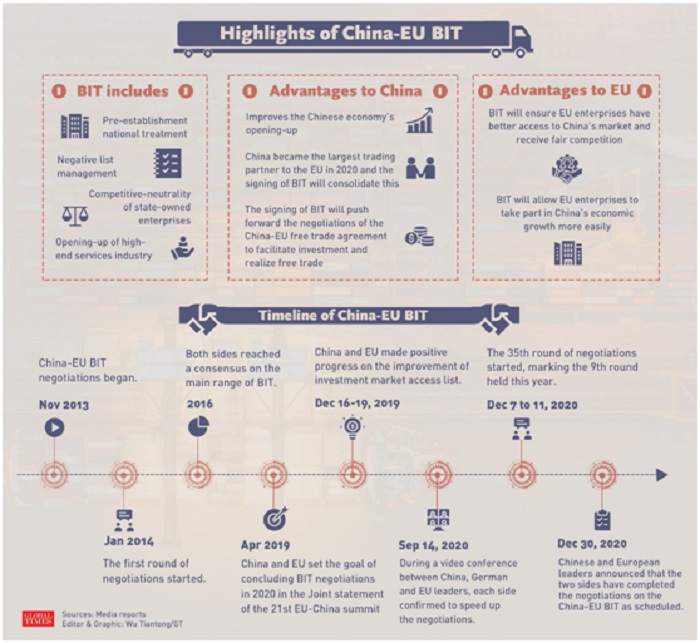



China and the EU have completed negotiations over an epic bilateral investment treaty (BIT), signaling that the top agenda for bilateral economic and trade relations has run its planned course for the world’s top developed economy and the largest developing economy. A comprehensive, balanced and high-level investment deal is expected to be reached soon.
When Chinese President Xi Jinping held a conference via video link on Wednesday night with leaders of Germany and France, President of the European Council Charles Michel and EU President Ursula von der Leyen, the two sides jointly announced that the negotiations on the China-EU bilateral investment treaty have been completed as scheduled.
Xi stressed during the video conference that the “balanced, high-level, and mutually beneficial” pact demonstrates China’s determination and confidence to open up on a higher level, and it will provide broader market access, a better business environment, stronger institutional guarantees and brighter prospects for bilateral cooperation.
The BIT will push the post-COVID-19 global economic recovery, promote global trade, investment liberalization and facilitation, enhance the international community’s confidence in economic globalization and free trade so as to contribute to China and the EU’s efforts to build an open global economy, Xi said.
Xi vowed that China and the EU – two of the world’s major powers, civilizations and markets – will enhance mutual trust, properly manage differences and join hands together to kick off a new start in 2021.
The pact shows to the world that even if China and EU have differences on some issues, both sides have the political willingness to enhance dialogue, deepen cooperation and share the benefits based on mutual respect, he said.
The BIT, also known as Comprehensive Agreement on Investment (CAI), benchmarks international economic and trade rules and focuses on institutional openness, the Chinese Ministry of Commerce (MOFCOM ) said on Wednesday.
It covers far more areas than traditional bilateral investment treaties, with outcomes covering four aspects, namely market access commitments, fair competition rules, sustainable development and dispute settlement.
Both have made “high-level and reciprocal” market access commitments, and all the rules are “applied both ways,” the MOFCOM noted.
Long-awaited progress
The hard-won achievement has taken enormous efforts from both sides, especially during the year 2020 when the COVID-19 pandemic battered the whole world. Based on mutual respect, open and practical cooperative attitudes, the talks have been finalized by the end of the year, and follow-up works will be started immediately, including making the legal text of the agreement available for signing, accelerating internal approval processes, promoting the early inking and entry into force of the agreement which will benefit both people and businesses, experts said on Wednesday.
The announcement topped off a seven-year endeavor to forge greater closeness between two of the world’s largest economies, in another major win for multilateralism after a mammoth trade deal having been clinched by China and 14 other Asia-Pacific economies.
The talks kicked off in late 2013, with 35 rounds of official negotiations having been held, including 10 rounds in 2020, which marked the 45th anniversary of the establishment of diplomatic relations between China and the EU.
The Chinese leadership has called for ramped-up talks on many important occasions, including the China International Import Expo and the G20 summit. Premier Li Keqiang, after announcing the start of talks for the BIT protocol in a meeting with EU leaders in 2013, agreed with the EU at a meeting in 2019 on the goal to complete the negotiations by 2020.
A high-level negotiation supervision mechanism was also put in place last year, headed by Chinese Vice-Premier Liu He and Valdis Dombrovskis, executive vice president of the European Commission.
Wednesday’s feat surmounted ideological and political discrepancies, ironed out the sticking points in some sensitive areas and brushed aside thinly veiled obstruction by the US, experts said, lauding it as an extraordinary boost for pragmatic cooperation between the EU and its largest trading partner China, despite lingering reservations among some EU member states over some issues.
Wednesday’s announcement apparently clears up concerns over the remaining reservations and starts a new chapter in China-EU ties, experts said.
“Companies in Europe and China still have concerns about investing in the other’s market, with European firms worrying about Chinese policies not being transparent enough, and Chinese companies worrying about legal pathways should they face problems in their investment in Europe,” Gao Lingyun, an expert at the Chinese Academy of Social Sciences in Beijing, told the Global Times on Tuesday.
Deal benefits all
The completion of the BIT talks, apparently a piece of uplifting news for both China and the EU, sets the course for the global economy to emerge from the still ravaging COVID-19 pandemic and the US-inflicted unilateral hegemony, observers noted.
The latest achievement signals a “brand new cooperative model” between the world’s largest emerging economy and the world’s largest group of developed countries, Zhao Junjie, a research fellow at the Institute of European Studies of the Chinese Academy of Social Sciences, told the Global Times.
It would be of great significance to Europe at a time when its efforts to stimulate economic development is restrained by the persisting pandemic, as Europe needs a lot of capital to fight the disease, and what is left to revitalize the economy is not adequate, Zhao said, while noting that the would-be deal will help channel external investment capital from China to European countries, which will help their economies recover as soon as possible.
For China, trade relations with Europe have developed fast in recent years, but bilateral investment has lagged seriously behind, with investment to and from Europe only accounting for a tiny proportion of the two sides’ overall foreign investment, Zhao said.
The soon-to-be-concluded BIT agreement will set a record in the scale of industries and investment volume involved, compared with similar agreements, according to Zhao.
When the agreement is signed, it will facilitate investment flow from Europe to China, while Chinese companies will enjoy a more standardized legal framework to do businesses in the huge European markets, with little chance of massive trade friction, regional affairs observers said. They stressed that it is beneficial to Chinese firms, considering the safety and stability of European markets, which provide many good investment assets.
Zhao particularly nurtured hopes for a leap in digital, green economy and agricultural cooperation between China and European countries.
“The EU generally lags behind China in terms of the digital economy such as cloud computing, but it can provide a lot of experience in green industries such as carbon emissions. There will be great scope for strengthening cooperation between China and Europe in those industries, whether in terms of trade or investment.”
Source: Global Times


The Humanitarian Service Diamond Awards has.
A Chinese Company, Inner Galaxy Steel.


The Programme Coordinator, Regulatory, Compliance and.


A Non-Governmental Organization (NGO), Committee for.
The Trustfund Pensions Limited has chided.


The House of Representatives Committee on.
The China General Chamber of Commerce.


Senator Chuka Utazi who represented Enugu.


An Abuja based Legal Practitioner, Ugochukwu.


The African business community in Yiwu,.
Leave a Comment